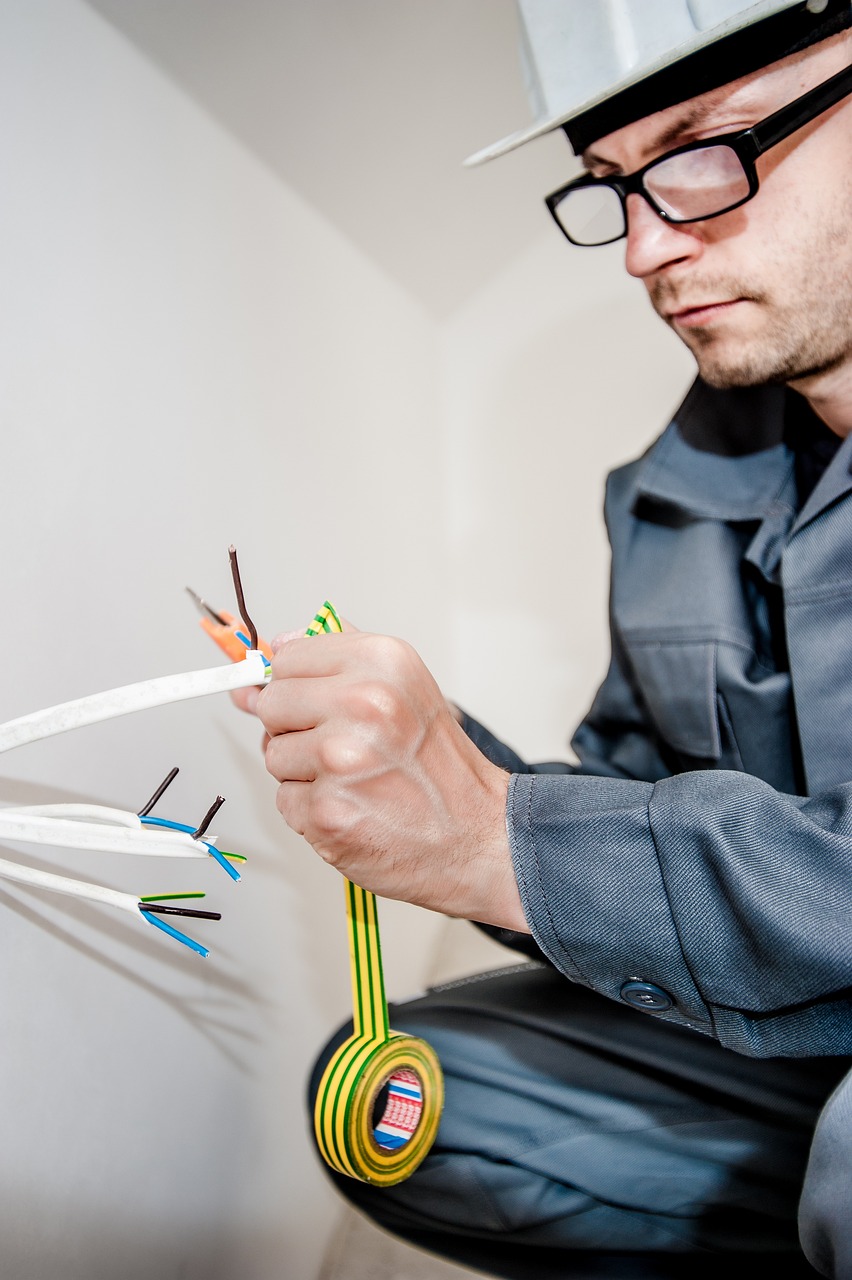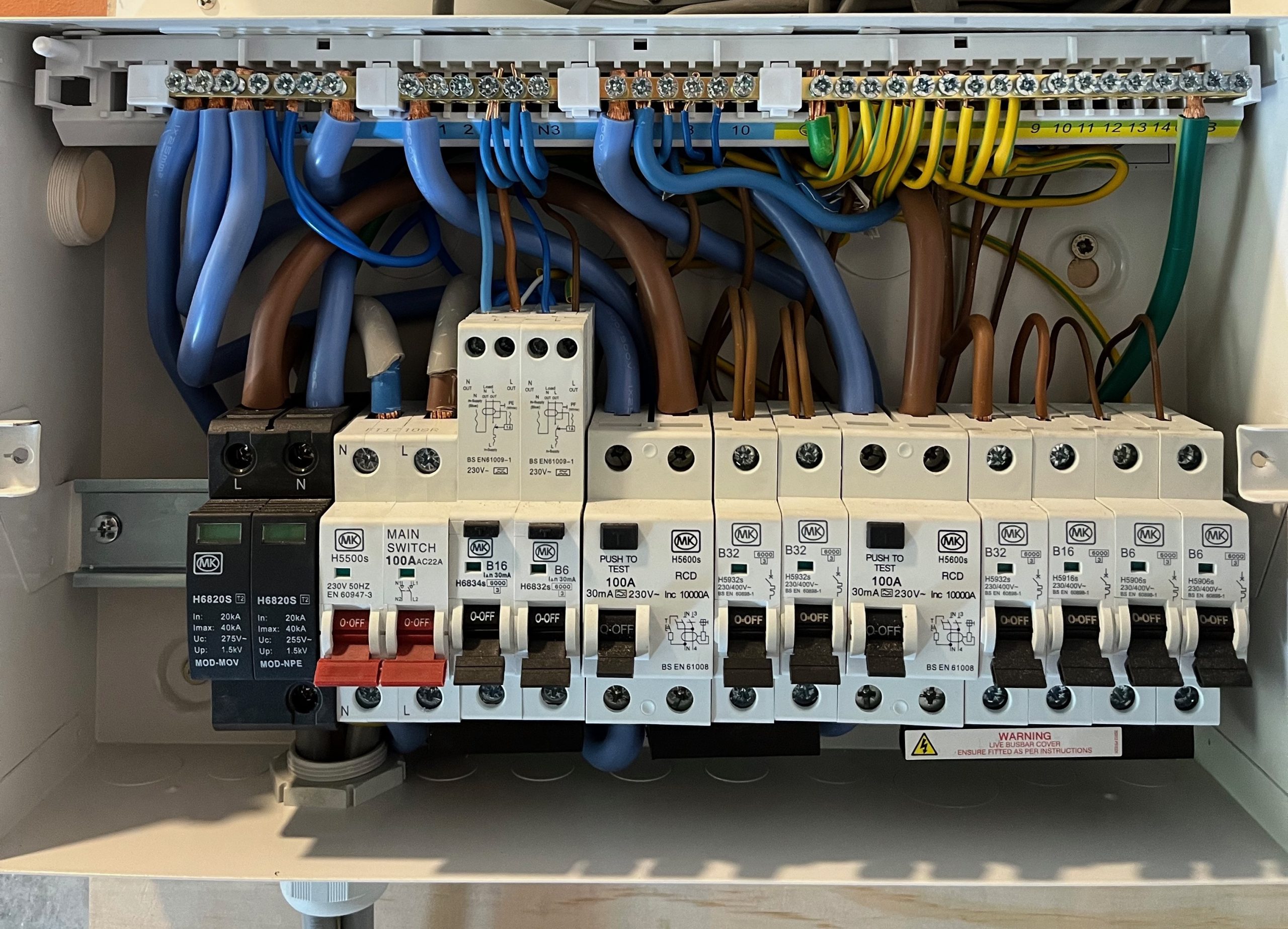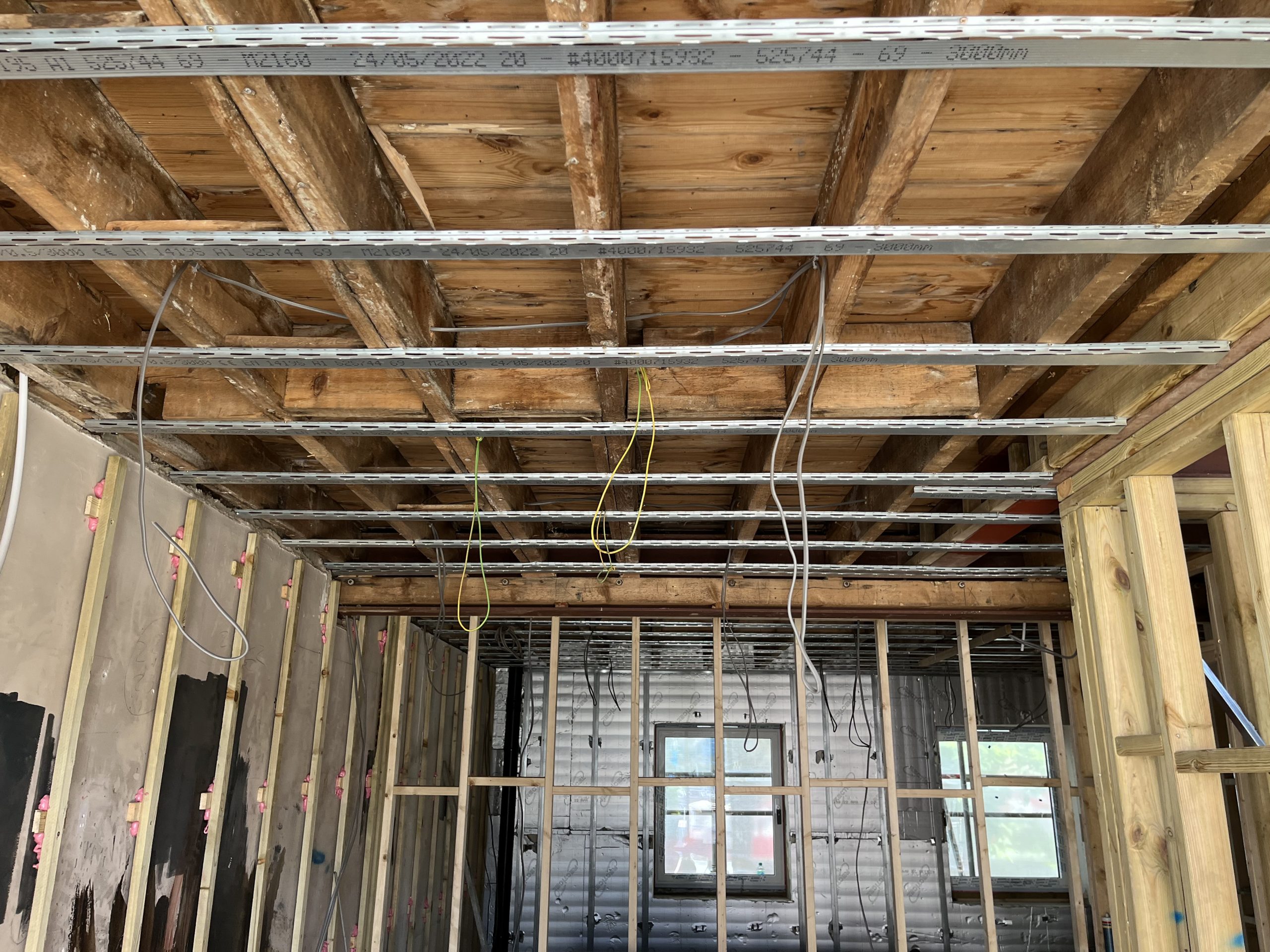Electrical REWIRING
ARE YOU LOOKING FOR A FULL OR PART REWIRING?
We offer a complete range of rewiring solutions, no matter what the size or the age of your property.
Our Electricians are fully City and Guilds qualified and insured. We can take care of all your rewiring needs, no matter where you are in Guildford or Surrey. All the homeowners of Guildford and Surrey can benefit from our extensive experience and our competitive prices.
Our aim is to provide a good quality electrical service based on good manners, good electrical practice, fair pricing and reliability.

What is involved in a full house rewire?
The work is carried out in two stages.
First fix – the new cabling and back boxes for all sockets and switches are installed. This involves quite a lot of disruption and dust. The carpets and flooring are lifted and pulled back to expose the floor boards which need to be lifted to allow the cables installation. We need to channel into the walls to get the cable to all sockets and switches.
Second fix – the sockets, switches, light fittings and fusebox are installed. Everything is tested to prove the circuits are electrically safe and the design complies with the latest regulations.
On completion of works the NICEIC certificates are issued and work will be registered with local building control.
Rewiring a house is a major undertaking, we will carry out the work as efficiently as possible. Rewiring service do not include any plastering or decorating work.

Does my property need rewiring?
Often the answer is not straight forward, as some parts of the installation may be satisfactory, others not so. Due to regulations, safety and inevitable deterioration, sooner or later it becomes necessary to rewire a property. Some older installations may have had modifications carried out while older versions of the Wiring Regulations were in force and now need improvement or rewiring.
Please call us for a free House Rewire Survey.

How Long Does It Take To Rewire A House?
The length of time it takes to rewire a house can vary greatly depending on the size of the house, the age of the property, the type of wiring and fittings used, and the complexity of the job.
For a standard 3-bedroom house rewiring, it can typically take anywhere from 3-10 days to complete the rewiring. However, larger properties or those that require more extensive work, can take longer, up to 2-3 weeks or more.

How much does it cost to rewire a house?
The cost of a house electrical rewire depends on the size of your house, and the complexity of the work required. Whether the house is occupied or vacant, how many bedrooms does the property have and the age of the property. The cost is determined by a variety of factors. For example, 3 bed house full rewiring will cost from £3,000 and 3 bed flat from £2500.
It’s also worth considering that rewiring your home can increase the value of your property.

What are some common signs that a house may need to be rewired?
Frequent circuit breaker trips or blown fuses: This may indicate that the electrical system is overloaded and not able to handle the current demand.
Dimming or flickering lights: This can indicate a problem with the electrical supply and may be caused by loose connections or a faulty circuit.
Scorch marks around outlets and switches: This can be a sign of an electrical fire hazard and may indicate that the wiring is damaged or not properly grounded.
Old or outdated wiring: If the wiring in your house is more than 25 years old, it may not be able to handle the current demand for electricity.
Lack of RCD (residual-current device) protection: This type of protection is designed to protect people from electrical shock, if your home lacks this protection, it may be a sign that the wiring is outdated.
The presence of aluminum wiring: This type of wiring was commonly used in the 1960s and 1970s, but it is now considered a fire hazard and should be replaced.
Warm or hot walls, floors, or ceilings near electrical outlets: This can indicate a problem with the wiring and may be caused by a short circuit.
A burning smell or unusual smell near electrical outlets or appliances: This can indicate a problem with the wiring and may be caused by a short circuit or overheating.
It’s important to note that these signs may also be caused by other issues, and it’s always best to consult with a qualified electrician to determine the cause of the problem and if house rewiring is necessary.
How to determine if a house needs rewiring?
There are several ways to determine if a house needs rewiring:
Visual inspection: A qualified electrician can inspect the wiring in your house and identify any potential issues or hazards, such as old or outdated wiring, loose connections, or damaged insulation.
Testing: A qualified electrician can use specialized testing equipment to check the condition of the wiring, including measuring the electrical current, voltage and resistance to detect any issues.
Age of the wiring: The age of the wiring is an important factor in determining if a house needs rewiring. If the wiring is more than 25 years old, it may not be able to handle the current demand for electricity and may need to be replaced.
Upgrading: If you’re planning to upgrade your electrical appliances or add new electrical circuits, it may be necessary to rewire your house to accommodate the increased demand.
Safety hazards: If you notice any signs of electrical hazards, such as frequent circuit breaker trips or blown fuses, dimming or flickering lights, or scorch marks around outlets and switches, it may be necessary to rewire your house to ensure the safety of your home.
It’s important to note that a house may not need a full rewiring, sometimes it can be repaired or upgraded to bring it up to code, it’s always best to consult with a qualified electrician to determine the condition of the wiring and if rewiring is necessary.
What are the building regulations and safety standards that must be followed when rewiring a house in the UK?
When rewiring a house in the UK, it’s important to comply with the building regulations and safety standards set by the UK government. These regulations are designed to ensure that all electrical work is safe and meets certain standards.
Building Regulations Part P: This covers electrical safety in dwellings houses, it’s mandatory to comply with this part of the regulations if you’re planning to carry out any electrical work in a house.
BS 7671:2018 (IET Wiring Regulations): This is the national standard for electrical installations in the UK, it covers the design, selection, erection, verification, inspection, testing, and certification of electrical installations.
The Health and Safety at Work Act 1974: This requires employers to ensure, so far as is reasonably practical, the health, safety and welfare at work of all their employees, including those working on electrical installations.
It is mandatory for all electrical work, including house rewiring, to be carried out by a qualified electrician and must be certified, Electricians must be registered with a competent person scheme, such as NAPIT, NICEIC, and ELECSA.
It’s important to note that regulations and standards are subject to change and it’s always best to consult with a qualified electrician to ensure compliance.
What areas we cover for Electrical Rewiring?
Some of the areas we cover for the Electrical Rewiring:
- Guildford
- Woking
- Godalming
- Leatherhead
- Weybridge
- Kingston-upon-Thames
- Dorking
- Cobham
- Richmond
- Surrey
- South West London
- West London
